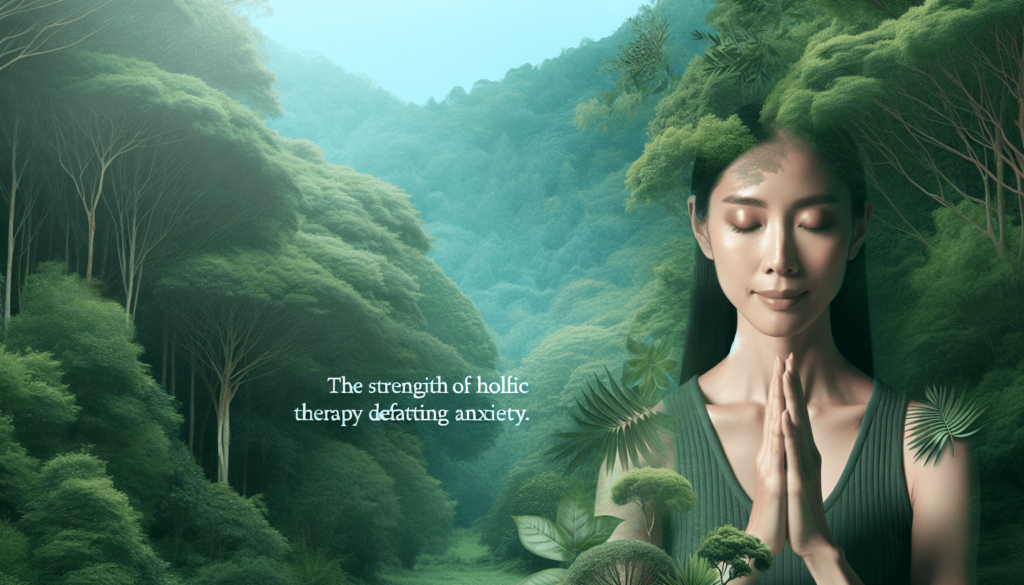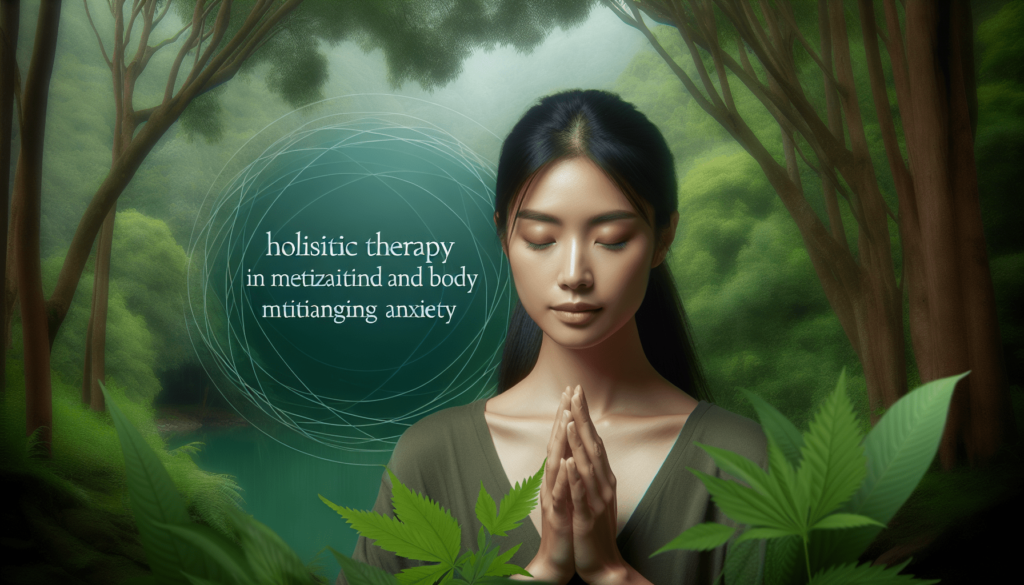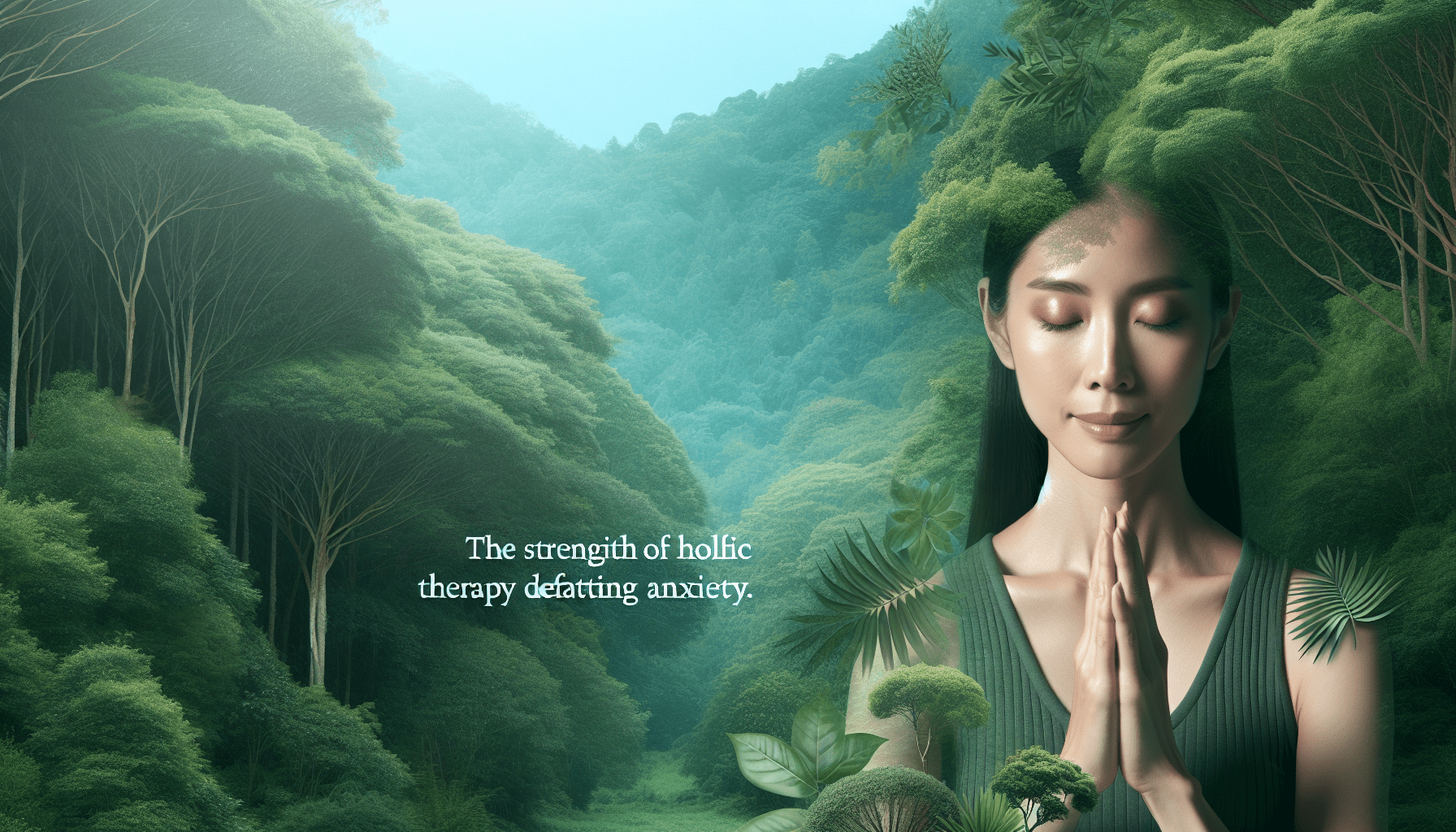Have you been struggling with anxiety and looking for a natural way to overcome it? In this article, you will learn about the power of holistic therapy in managing and reducing anxiety. Read on to discover how holistic approaches can help you find peace and balance in your life.

Understanding Anxiety and its Impact
Anxiety is a common mental health condition that affects millions of people worldwide. It can manifest in various ways, such as constant worry, fear, and physical symptoms like rapid heartbeat and sweating. Living with anxiety can be challenging and impact your daily life.
Holistic therapy takes a whole-body approach to address anxiety, focusing on the mind, body, and spirit. By understanding the root causes of your anxiety and how it affects your overall well-being, you can begin a journey towards healing and recovery.
How Holistic Therapy Works
Holistic therapy combines different healing modalities to address anxiety on multiple levels. This may include traditional talk therapy, mindfulness practices, meditation, yoga, acupuncture, and nutritional counseling. By treating the whole person, rather than just the symptoms, holistic therapy aims to bring balance and harmony to your mind, body, and spirit.
When you engage in holistic therapy, you are not just treating the surface-level symptoms of anxiety, but delving deep into the underlying causes. This comprehensive approach allows you to explore and heal all aspects of yourself, leading to long-lasting transformation and inner peace.
The Benefits of Holistic Therapy for Anxiety
Holistic therapy offers a wide range of benefits for individuals struggling with anxiety. Here are some of the key advantages of incorporating holistic approaches into your treatment plan:
1. Personalized Treatment
Holistic therapy recognizes that each person is unique and may require different interventions to address their anxiety effectively. Your therapist will work with you to create a personalized treatment plan that meets your individual needs and goals. This tailored approach ensures that you receive the support and guidance you need to overcome anxiety.
2. Mind-Body Connection
Holistic therapy emphasizes the connection between the mind and body, understanding that emotional and mental well-being are closely linked to physical health. By addressing both aspects simultaneously, you can achieve a deeper level of healing and balance. Practices like yoga and meditation can help you cultivate this mind-body connection and reduce anxiety symptoms.
3. Non-Invasive Treatment Options
Unlike medication-based treatments, holistic therapy offers non-invasive and natural approaches to managing anxiety. This can include practices like aromatherapy, herbal remedies, and energy healing techniques. These gentle interventions can help you reduce anxiety without the side effects of medications, promoting overall well-being and vitality.
4. Holistic Lifestyle Changes
Holistic therapy encourages you to make positive lifestyle changes that support your mental and emotional well-being. This may include adopting a nutritious diet, engaging in regular exercise, getting enough sleep, and practicing self-care activities. By making these holistic lifestyle changes, you can create a supportive environment for healing and recovery from anxiety.
Common Holistic Therapies for Anxiety
There are several holistic therapies that have shown promise in helping individuals manage and overcome anxiety. Here are some of the most common approaches used in holistic therapy for anxiety:
1. Mindfulness-Based Stress Reduction (MBSR)
MBSR is a popular form of therapy that combines mindfulness meditation, body awareness, and yoga to help individuals cope with stress and anxiety. By cultivating mindfulness and awareness of the present moment, you can reduce the impact of anxious thoughts and fears. MBSR teaches you to observe your thoughts without judgment, promoting a sense of calm and peace.
2. Acupuncture
Acupuncture is a traditional Chinese medicine practice that involves inserting thin needles into specific points on the body to promote healing and balance. For anxiety, acupuncture can help regulate the flow of energy (Qi) in the body and alleviate symptoms like tension, restlessness, and insomnia. Many people find acupuncture to be a relaxing and effective treatment for anxiety.
3. Yoga and Meditation
Yoga and meditation are powerful tools for reducing anxiety and promoting relaxation. Through gentle movement, breathwork, and mindfulness practices, you can release tension, calm the mind, and improve your emotional well-being. Yoga and meditation teach you to be present in the moment and cultivate a sense of inner peace, which can help you manage anxiety symptoms.
4. Nutrition and Supplements
Eating a healthy diet and taking supplements can have a significant impact on your mental health and well-being. Certain nutrients, such as omega-3 fatty acids, magnesium, and vitamin B complex, are known to support brain health and reduce anxiety. Your holistic therapist may recommend dietary changes or supplements to help you manage anxiety symptoms and improve your overall health.
Integrating Holistic Therapy Into Your Life
If you are interested in exploring holistic therapy for anxiety, there are several steps you can take to integrate these approaches into your daily life:
-
Consult with a Holistic Therapist: Start by finding a qualified holistic therapist who specializes in treating anxiety. They can assess your needs, create a personalized treatment plan, and guide you through the healing process.
-
Discover What Works for You: Experiment with different holistic therapies to see which ones resonate with you the most. Whether it’s yoga, meditation, acupuncture, or nutritional counseling, find the modalities that help you feel calm and centered.
-
Commit to Self-Care: Make self-care a priority in your daily routine. Engage in activities that nourish your mind, body, and spirit, such as taking walks in nature, journaling, spending time with loved ones, or practicing mindfulness.
-
Practice Mindfulness: Cultivate mindfulness in your daily life by being present in the moment and observing your thoughts without judgment. Mindfulness can help you reduce anxiety symptoms and cultivate a sense of inner peace.
-
Maintain a Healthy Lifestyle: Adopt a healthy lifestyle that supports your mental and emotional well-being. This may include eating a nutritious diet, getting regular exercise, getting enough sleep, and avoiding substances that exacerbate anxiety.
By integrating holistic therapy into your life and committing to your healing journey, you can overcome anxiety and find peace and balance. Remember that healing is a process, and it’s okay to seek support and guidance along the way.

Conclusion
Anxiety can be a challenging condition to live with, but it is possible to find relief and healing through holistic therapy. By taking a whole-body approach to address anxiety and incorporating various healing modalities, you can discover a path to greater well-being and peace.
If you are struggling with anxiety, consider exploring holistic therapy as a natural and effective way to manage your symptoms. With personalized treatment, mind-body practices, non-invasive interventions, and holistic lifestyle changes, you can overcome anxiety and cultivate a sense of balance and harmony in your life.
Remember that you are not alone in your journey towards healing. Reach out to a holistic therapist, explore different holistic therapies, and commit to self-care and mindfulness. By embracing the power of holistic therapy, you can overcome anxiety and create a life filled with joy, peace, and well-being.

